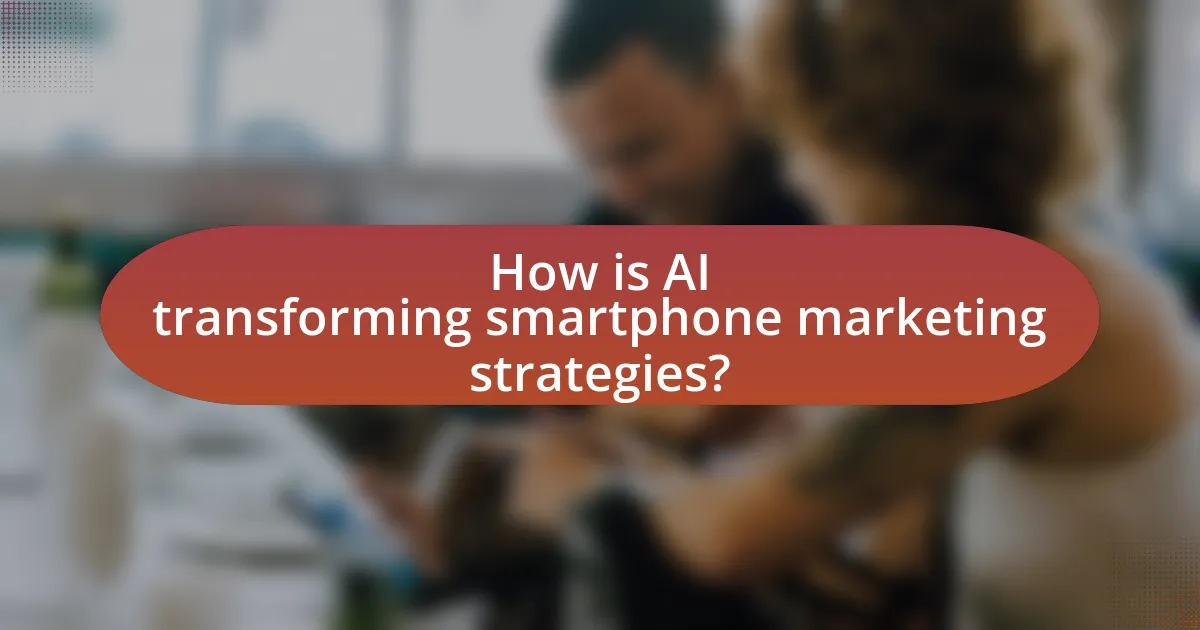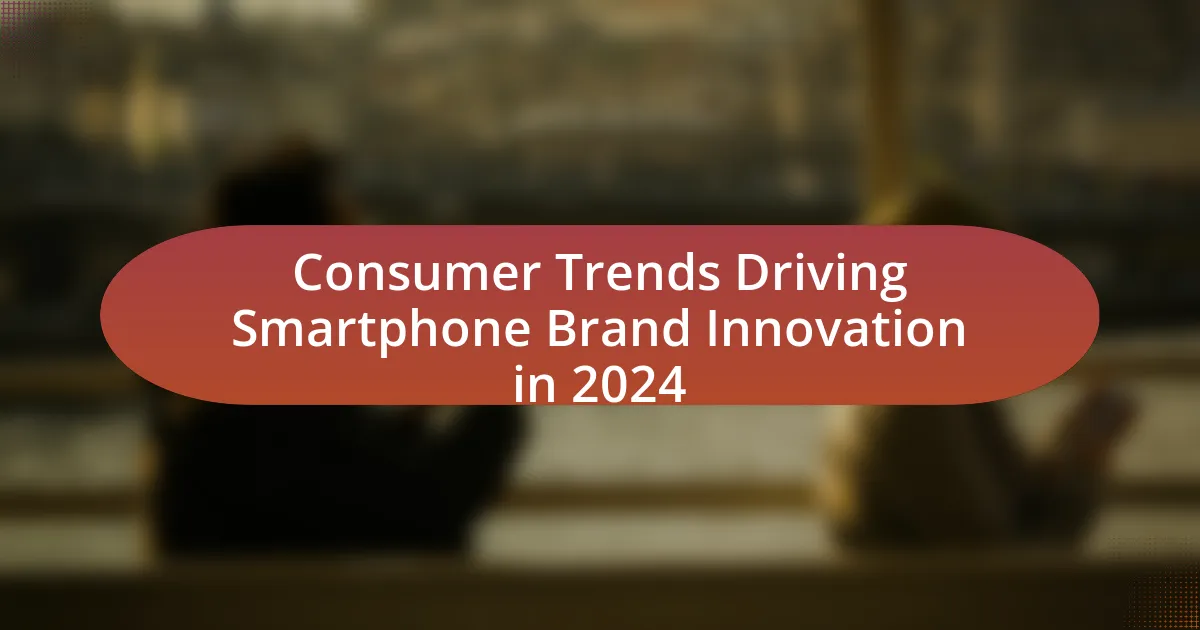The article examines the pivotal role of artificial intelligence (AI) in driving innovation within smartphone brands. It highlights how AI enhances user experiences through personalized features, optimizes product development, and influences design and functionality. Key AI technologies such as machine learning, natural language processing, and computer vision are discussed, along with their impact on consumer behavior and marketing strategies. The article also addresses the challenges brands face in AI integration, including data privacy and algorithm bias, while outlining future trends and best practices for ethical AI use in the smartphone industry.

What is the Role of AI in Shaping Smartphone Brand Innovation?
AI plays a crucial role in shaping smartphone brand innovation by enabling personalized user experiences and optimizing product development processes. Through machine learning algorithms, brands can analyze consumer data to identify preferences and trends, leading to the creation of features that resonate with users. For instance, AI-driven analytics can inform design choices and functionality enhancements, as seen in the integration of advanced camera systems and voice recognition technologies in recent smartphone models. Additionally, AI facilitates rapid prototyping and testing, allowing brands to iterate on designs more efficiently, ultimately resulting in innovative products that meet market demands.
How does AI influence smartphone design and functionality?
AI significantly influences smartphone design and functionality by enabling advanced features such as personalized user experiences, enhanced camera capabilities, and improved battery management. For instance, AI algorithms analyze user behavior to customize app suggestions and interface layouts, making devices more intuitive. Additionally, AI-powered image processing enhances photo quality by optimizing settings in real-time, as seen in smartphones like the Google Pixel, which uses machine learning for superior photography. Furthermore, AI contributes to battery efficiency by predicting usage patterns and adjusting power consumption accordingly, leading to longer battery life. These advancements demonstrate how AI is integral to modern smartphone innovation, shaping both aesthetic design and practical functionality.
What specific AI technologies are utilized in smartphone innovation?
Smartphone innovation utilizes specific AI technologies such as machine learning, natural language processing, computer vision, and neural networks. Machine learning algorithms enhance user experience by personalizing app recommendations and optimizing battery life based on usage patterns. Natural language processing enables voice assistants like Siri and Google Assistant to understand and respond to user queries effectively. Computer vision is employed in features like facial recognition and augmented reality applications, improving security and user interaction. Neural networks facilitate advanced image processing, enhancing photo quality through techniques like image stabilization and scene recognition. These technologies collectively drive significant advancements in smartphone capabilities and user engagement.
How do these technologies enhance user experience?
AI technologies enhance user experience by personalizing interactions and improving device functionality. For instance, AI algorithms analyze user behavior to tailor recommendations, such as app suggestions and content feeds, which increases user engagement. Additionally, features like voice recognition and natural language processing streamline communication, making it more intuitive. According to a study by McKinsey, companies that effectively leverage AI can improve customer satisfaction by up to 20%, demonstrating the tangible benefits of these technologies in enhancing user experience.
Why is AI important for smartphone brand competitiveness?
AI is crucial for smartphone brand competitiveness because it enhances user experience through personalization and efficiency. By leveraging AI algorithms, brands can analyze user data to tailor features, optimize performance, and improve customer service. For instance, AI-driven camera enhancements in smartphones, such as real-time image processing and scene recognition, significantly elevate product appeal, leading to increased market share. According to a report by McKinsey, companies that effectively utilize AI can boost their profitability by 20% or more, underscoring the financial benefits of AI integration in product development and marketing strategies.
What advantages do AI-driven brands have over traditional brands?
AI-driven brands possess significant advantages over traditional brands, primarily through enhanced data analytics and personalization capabilities. These brands leverage advanced algorithms to analyze consumer behavior in real-time, allowing for tailored marketing strategies that resonate more effectively with target audiences. For instance, a study by McKinsey & Company found that companies utilizing AI for customer engagement can achieve a 10-20% increase in sales due to improved targeting and personalization. Additionally, AI-driven brands can optimize supply chain management and inventory control, leading to reduced operational costs and increased efficiency. This operational agility enables them to respond swiftly to market changes, a critical advantage in the fast-paced smartphone industry.
How does AI contribute to market differentiation?
AI contributes to market differentiation by enabling smartphone brands to offer personalized user experiences and advanced features that set them apart from competitors. Through machine learning algorithms, brands can analyze user data to tailor services, such as customized app recommendations and adaptive battery management, enhancing customer satisfaction. For instance, a study by McKinsey & Company found that companies leveraging AI for personalization can achieve a 10-15% increase in revenue. This ability to provide unique, data-driven experiences allows brands to establish a distinct identity in a crowded market, ultimately driving customer loyalty and preference.
What challenges do smartphone brands face when integrating AI?
Smartphone brands face significant challenges when integrating AI, primarily related to data privacy, algorithm bias, and hardware limitations. Data privacy concerns arise as brands must navigate regulations like GDPR while collecting and processing user data for AI functionalities. Algorithm bias can lead to unfair outcomes, as AI systems may reflect the biases present in training data, impacting user experience and brand reputation. Additionally, hardware limitations restrict the processing power available for advanced AI applications, which can hinder performance and user satisfaction. These challenges necessitate careful consideration and strategic planning to ensure successful AI integration in smartphones.
What are the technical limitations of AI in smartphones?
The technical limitations of AI in smartphones include constrained processing power, limited battery life, and challenges in data privacy. Smartphones typically have less computational capacity compared to dedicated AI hardware, which restricts the complexity of AI algorithms that can be executed. For instance, advanced machine learning models often require significant resources that exceed what mobile devices can provide. Additionally, the reliance on battery power means that intensive AI tasks can quickly drain energy, leading to performance trade-offs. Furthermore, data privacy concerns arise as AI systems often require access to personal data for effective functioning, which can conflict with user privacy expectations and regulations. These limitations highlight the challenges in fully leveraging AI capabilities within the constraints of smartphone technology.
How do consumer perceptions affect AI adoption in smartphones?
Consumer perceptions significantly influence AI adoption in smartphones by shaping user expectations and acceptance levels. Positive perceptions, such as viewing AI as a tool for enhancing user experience through features like voice recognition and personalized recommendations, lead to higher adoption rates. For instance, a survey by Deloitte in 2021 indicated that 61% of consumers were more likely to purchase smartphones with advanced AI capabilities, highlighting the importance of consumer sentiment in driving market trends. Conversely, negative perceptions, such as concerns over privacy and data security, can hinder adoption, as seen in a 2020 study by Pew Research Center, which found that 79% of consumers expressed apprehension about how companies use their data. Thus, consumer perceptions directly impact both the willingness to adopt AI technologies and the overall success of AI integration in smartphones.

How is AI transforming smartphone marketing strategies?
AI is transforming smartphone marketing strategies by enabling personalized customer experiences and optimizing advertising efforts. Through machine learning algorithms, brands can analyze consumer behavior and preferences, allowing for targeted marketing campaigns that resonate with specific audiences. For instance, a study by McKinsey found that companies using AI for personalization can increase their marketing ROI by 10 to 30 percent. Additionally, AI-driven analytics tools help brands identify trends and forecast demand, leading to more efficient resource allocation and improved customer engagement. This data-driven approach not only enhances brand loyalty but also drives sales growth in a competitive market.
What role does AI play in consumer data analysis?
AI plays a crucial role in consumer data analysis by enabling businesses to process and interpret vast amounts of data efficiently. Through machine learning algorithms, AI can identify patterns and trends in consumer behavior, allowing brands to tailor their products and marketing strategies effectively. For instance, a study by McKinsey & Company found that companies using AI for data analysis can increase their marketing ROI by 15-20%. This demonstrates that AI not only enhances the accuracy of consumer insights but also drives significant business value.
How do brands leverage AI to understand consumer behavior?
Brands leverage AI to understand consumer behavior by analyzing vast amounts of data to identify patterns and preferences. Through machine learning algorithms, brands can process consumer interactions, purchase history, and social media activity to gain insights into buying habits. For instance, a study by McKinsey found that companies using AI for customer insights can increase their marketing ROI by 15-20%. This data-driven approach allows brands to tailor their products and marketing strategies to meet consumer needs more effectively, enhancing customer satisfaction and loyalty.
What tools are available for AI-driven market analysis?
AI-driven market analysis utilizes various tools to enhance data interpretation and decision-making. Notable tools include IBM Watson Analytics, which leverages natural language processing to analyze data trends, and Google Analytics, which employs machine learning for predictive insights. Additionally, Tableau integrates AI capabilities for visual data analysis, while Salesforce Einstein provides AI-driven customer insights. These tools are validated by their widespread adoption in industries, demonstrating their effectiveness in transforming raw data into actionable market intelligence.
How does AI enhance personalized marketing in smartphones?
AI enhances personalized marketing in smartphones by analyzing user data to deliver tailored content and advertisements. This technology utilizes machine learning algorithms to process vast amounts of information, including user behavior, preferences, and demographics, enabling brands to create highly targeted marketing strategies. For instance, a study by McKinsey & Company found that companies using AI for personalization can achieve a 10-20% increase in sales. By leveraging AI, smartphone brands can optimize user engagement and improve customer satisfaction through relevant recommendations and timely promotions.
What techniques are used for personalized advertising?
Personalized advertising employs techniques such as data-driven targeting, behavioral tracking, and machine learning algorithms. Data-driven targeting utilizes consumer data to tailor ads based on demographics, interests, and past purchasing behavior, enhancing relevance and engagement. Behavioral tracking monitors user interactions across platforms, allowing advertisers to deliver ads that align with individual preferences and habits. Machine learning algorithms analyze vast datasets to predict consumer behavior and optimize ad placements in real-time, ensuring that the right message reaches the right audience at the right time. These techniques collectively improve the effectiveness of advertising campaigns, as evidenced by studies showing that personalized ads can lead to higher conversion rates and increased customer satisfaction.
How effective is AI in increasing customer engagement?
AI is highly effective in increasing customer engagement, as it enables personalized interactions and enhances user experiences. For instance, AI-driven chatbots can provide instant customer support, leading to a 70% reduction in response times and a significant increase in customer satisfaction. Additionally, AI algorithms analyze customer data to tailor marketing strategies, resulting in a 20% increase in conversion rates for brands that implement these technologies. These statistics demonstrate that AI not only facilitates immediate engagement but also fosters long-term customer loyalty through personalized experiences.

What future trends can we expect in AI and smartphone innovation?
Future trends in AI and smartphone innovation include enhanced personalization, improved battery life through AI optimization, and advanced camera capabilities utilizing machine learning. Enhanced personalization will allow smartphones to adapt to user preferences and behaviors, leading to a more intuitive user experience. AI optimization techniques are expected to extend battery life by managing power consumption more efficiently, as evidenced by companies like Apple and Samsung implementing AI-driven battery management systems. Additionally, advanced camera capabilities will leverage machine learning algorithms for better image processing, enabling features like real-time scene recognition and improved low-light performance, as seen in recent flagship models from major brands.
How will emerging AI technologies impact smartphone features?
Emerging AI technologies will significantly enhance smartphone features by enabling advanced functionalities such as improved camera capabilities, personalized user experiences, and enhanced security measures. For instance, AI-driven computational photography allows smartphones to capture high-quality images in various lighting conditions by optimizing settings automatically, as seen in devices like the Google Pixel series. Additionally, AI algorithms can analyze user behavior to tailor app recommendations and interface layouts, improving overall usability. Furthermore, AI-powered biometric systems, such as facial recognition and fingerprint scanning, provide more secure authentication methods, as demonstrated by Apple’s Face ID technology. These advancements illustrate how AI is transforming smartphones into more intelligent and user-centric devices.
What innovations are on the horizon for AI in smartphones?
Innovations on the horizon for AI in smartphones include advanced natural language processing, enhanced camera capabilities through computational photography, and improved battery management systems. These advancements will enable smartphones to understand and respond to user commands more intuitively, capture high-quality images in varying conditions, and optimize power consumption based on usage patterns. For instance, companies like Google and Apple are already integrating AI-driven features such as real-time language translation and smart photo editing, which demonstrate the potential for further enhancements in user experience and device efficiency.
How might consumer expectations evolve with AI advancements?
Consumer expectations are likely to evolve towards a demand for more personalized, efficient, and intuitive interactions with technology as AI advancements progress. As AI systems become more capable of understanding individual preferences and behaviors, consumers will expect brands to deliver tailored experiences that enhance usability and satisfaction. For instance, a study by McKinsey & Company found that 71% of consumers expect companies to deliver personalized interactions, highlighting a clear trend towards customization driven by AI capabilities. This shift will compel smartphone brands to innovate continuously, integrating AI features that anticipate user needs and streamline everyday tasks, thereby reshaping the competitive landscape in the industry.
What best practices should brands follow when implementing AI?
Brands should prioritize data quality and ethical considerations when implementing AI. High-quality, relevant data ensures that AI systems function effectively and produce accurate results, while ethical considerations help mitigate risks associated with bias and privacy violations. According to a 2021 McKinsey report, companies that invest in data quality see a 20% increase in AI performance. Additionally, establishing clear governance frameworks can guide responsible AI use, as highlighted by the European Commission’s guidelines on trustworthy AI, which emphasize transparency and accountability.
How can brands ensure ethical AI use in smartphones?
Brands can ensure ethical AI use in smartphones by implementing transparent data practices and adhering to established ethical guidelines. Transparency involves clearly communicating how user data is collected, processed, and utilized, which builds trust and accountability. Adhering to ethical guidelines, such as those set forth by organizations like the IEEE and the EU’s GDPR, ensures that AI systems respect user privacy and promote fairness. Additionally, conducting regular audits and assessments of AI algorithms can help identify and mitigate biases, ensuring that AI applications are equitable and just.
What strategies can enhance the effectiveness of AI in smartphone innovation?
Integrating advanced machine learning algorithms enhances the effectiveness of AI in smartphone innovation by enabling more personalized user experiences. For instance, utilizing deep learning techniques allows smartphones to analyze user behavior and preferences, leading to tailored recommendations and improved functionality. Research by Gartner indicates that by 2025, 75% of smartphone applications will leverage AI to enhance user engagement, demonstrating the growing reliance on AI for innovation. Additionally, implementing edge computing can optimize AI processing, reducing latency and improving real-time decision-making capabilities in smartphones. This strategy is supported by a study from IDC, which found that edge computing can enhance application performance by up to 50%, further validating its role in AI-driven smartphone advancements.




